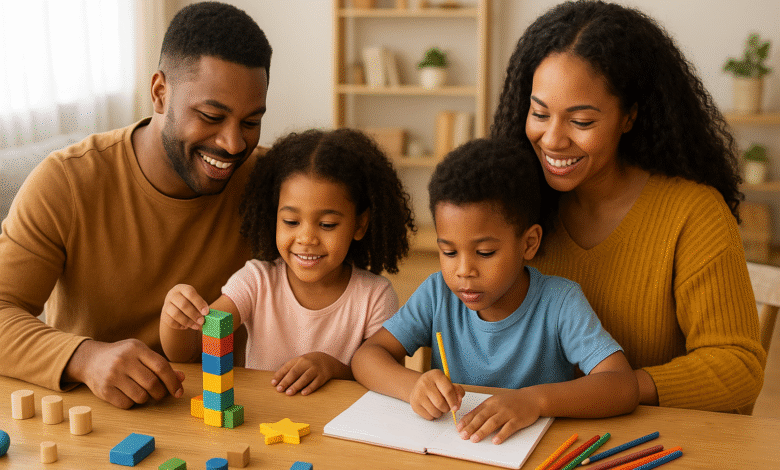Entertainment cwbiancaparenting: Merging Fun and Parenting in the Modern USA

In the fast-paced rhythm of modern family life, entertainment cwbiancaparenting has emerged as a creative way to merge parenting with both fun and education. Across the USA, many parents are rethinking how they guide their children’s growth, blending digital tools, media, and structured activities into daily routines.
This parenting style goes beyond simply handing a child a device—it’s about intentional choices, using entertainment that promotes learning, builds character, and strengthens family connections.
Entertainment cwbiancaparenting in American Homes
Modern American families are surrounded by digital media—TVs, tablets, smartphones, and laptops are now part of everyday life. But not all screen time is harmful. When used with care, entertainment can support healthy development and foster positive habits.
Entertainment cwbiancaparenting focuses on selecting safe, age-appropriate, and valuable content, guiding children through their interactions with media rather than leaving them alone with it. Parents actively join in—co-watching, discussing, and turning entertainment into teachable moments.
This balanced approach can spark creativity, improve focus, and enhance social skills. The goal is not to overload kids with screen time, but to make every digital moment meaningful.
Why Entertainment Matters in Parenting
Children naturally learn by observing, and what they watch influences their thoughts, emotions, and behaviors. Well-chosen media—whether educational shows or interactive learning apps—can introduce new concepts, enhance vocabulary, and build problem-solving skills.
With entertainment cwbiancaparenting, fun becomes a teaching tool. Lessons are delivered in ways children enjoy, without relying solely on discipline or lectures. This makes the parenting process more peaceful, engaging, and effective.
Blending Fun and Rules
The real strength of this method lies in balance. Parents don’t just allow free access to screens; they set guidelines. For example, 30 minutes of an educational app might be followed by outdoor activities, or a fun cartoon might be paired with a discussion about its lessons.
By co-watching and interacting—pausing to explain, asking questions, or sharing laughs—parents create a stronger emotional bond with their children. This mix of structure and enjoyment teaches self-control and builds trust.
Popular Tools for Entertainment cwbiancaparenting
Across the USA, several platforms have become favorites for this style of parenting. Here are some widely used tools:
| Platform | Age Range | Key Features |
|---|---|---|
| Netflix Kids | 3–12 years | Safe profiles, educational programs |
| Disney+ | 2–14 years | Family-friendly, ad-free |
| PBS Kids | 2–10 years | Interactive learning games, trusted characters |
| YouTube Kids | 2–12 years | Parental controls, diverse educational content |
| ABCmouse | 2–8 years | Structured learning activities |
These tools help children learn subjects such as math, reading, history, and emotional awareness—while keeping them entertained.
How Parents Are Applying This Approach
Instead of using screens just to keep kids quiet, many parents now use them as opportunities for quality time. Families might organize themed movie nights, use educational apps during study time, or engage in games that promote problem-solving.
Parents report that this shared approach creates stronger family bonds, encourages open communication, and helps children feel more supported.
Real Success Stories
Take the Williams family from Texas, for example. They noticed their 6-year-old was having trouble focusing at school. Rather than removing screens completely, they guided his usage—replacing random cartoons with shows like Wild Kratts and integrating ABCmouse into daily routines. Within two months, his focus improved, his vocabulary grew, and his curiosity about animals increased.
Another story comes from a single mother in New York who uses Disney+ and educational apps after work. She says, “It’s our way of winding down together, but I know he’s still learning something valuable.”
Practical Tips for Making It Work
If you want to apply entertainment cwbiancaparenting at home, here are some guidelines:
-
Plan Ahead – Choose age-appropriate content before screen time starts.
-
Set Limits – Define daily or weekly screen time and stick to it.
-
Mix Fun and Learning – Combine entertainment with educational goals.
-
Be Present – Watch together whenever possible and discuss what’s happening.
-
Praise Positive Learning – Highlight and encourage moments when your child learns something new.
-
Adjust as They Grow – Change the content and approach as your child’s needs evolve.
Common Mistakes to Avoid
Some parents fall into the trap of using screens as digital babysitters, leading to excessive screen time. Others choose content without checking for inappropriate messages or age ratings.
To avoid these mistakes:
-
Always preview content before showing it to your child.
-
Avoid screen time during meals or right before bed.
-
Watch for signs of over-dependence on devices.
-
Make entertainment an active, not passive, experience.
The Future of Entertainment cwbiancaparenting
As technology advances, parenting will evolve with it. AI-powered learning tools, virtual reality education, and personalized media will become more common. These innovations can speed up learning and improve engagement—but only with proper parental guidance.
Future entertainment cwbiancaparenting will likely give parents even more control, including content tracking, usage reports, and personalized learning plans for their children. The key will remain the same: parents must stay involved, informed, and intentional.
Conclusion
Parenting in today’s digital age doesn’t mean banning screens—it means using them wisely. Entertainment cwbiancaparenting offers a balanced, engaging, and educational way to raise children in a media-filled world.
By combining fun with structure, technology with real-life interaction, and entertainment with purposeful learning, families can strengthen bonds and prepare children for the future.
The USA is already leading in this approach, and more parents are discovering how this modern method transforms everyday moments into opportunities for growth.
FAQs
Q1: What is entertainment cwbiancaparenting?
It’s a modern parenting approach that combines digital entertainment with learning and structured interaction, ensuring children gain value from screen time.
Q2: Does this method mean more screen time for kids?
Not necessarily—it focuses on quality over quantity. The goal is to use screens intentionally, not excessively.
Q3: What are the benefits of entertainment cwbiancaparenting?
Benefits include improved focus, better vocabulary, stronger family bonds, and enhanced creativity.
Q4: Can this approach work for all age groups?
Yes, but the type of content and the level of parental involvement should be tailored to the child’s age.
Q5: How can I start entertainment cwbiancaparenting at home?
Begin by selecting age-appropriate educational content, setting clear time limits, and engaging with your child during viewing or gameplay.



